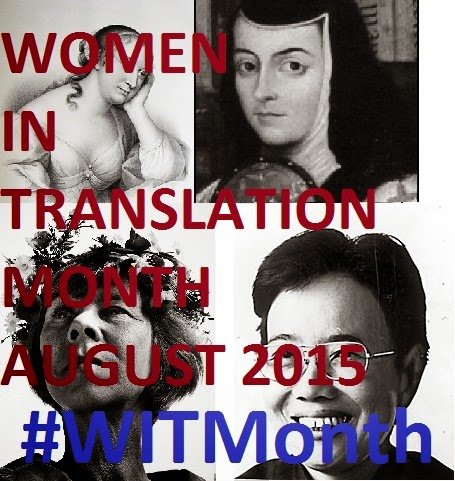 August is Women in Translation Month (WITMonth), designed to encourage readers, reviewers, publishers, and translators to explore more books in translation by women. If you've been following the VIDA count, then the grim statistics around women in translation (gathered diligently by Meytal Radzinski) is, unfortunately, not a surprise: women writers comprise only about 30% of books translated into English. As I'm passionate about cultivating a diverse literary ecosystem, this is a project near and dear to my heart. And though I'm happy WITMonth is an annual event, I'm getting started right now. Because there are SO MANY good books and I'm sure there are SO MANY MORE out there waiting to be picked up by a publisher and gobbled by readers.I immediately pulled all the books from my shelves that fit the bill. I made a read pile and a to-be-read pile. Of the read pile, I'd like to make some recommendations, for those of you who'd like to join me in WITMonth. Read these books! And I'll be diving into the to-be-read pile and writing about the gems in that pile in August. Read those books too! Let's talk about 'em!Recommended Books
August is Women in Translation Month (WITMonth), designed to encourage readers, reviewers, publishers, and translators to explore more books in translation by women. If you've been following the VIDA count, then the grim statistics around women in translation (gathered diligently by Meytal Radzinski) is, unfortunately, not a surprise: women writers comprise only about 30% of books translated into English. As I'm passionate about cultivating a diverse literary ecosystem, this is a project near and dear to my heart. And though I'm happy WITMonth is an annual event, I'm getting started right now. Because there are SO MANY good books and I'm sure there are SO MANY MORE out there waiting to be picked up by a publisher and gobbled by readers.I immediately pulled all the books from my shelves that fit the bill. I made a read pile and a to-be-read pile. Of the read pile, I'd like to make some recommendations, for those of you who'd like to join me in WITMonth. Read these books! And I'll be diving into the to-be-read pile and writing about the gems in that pile in August. Read those books too! Let's talk about 'em!Recommended Books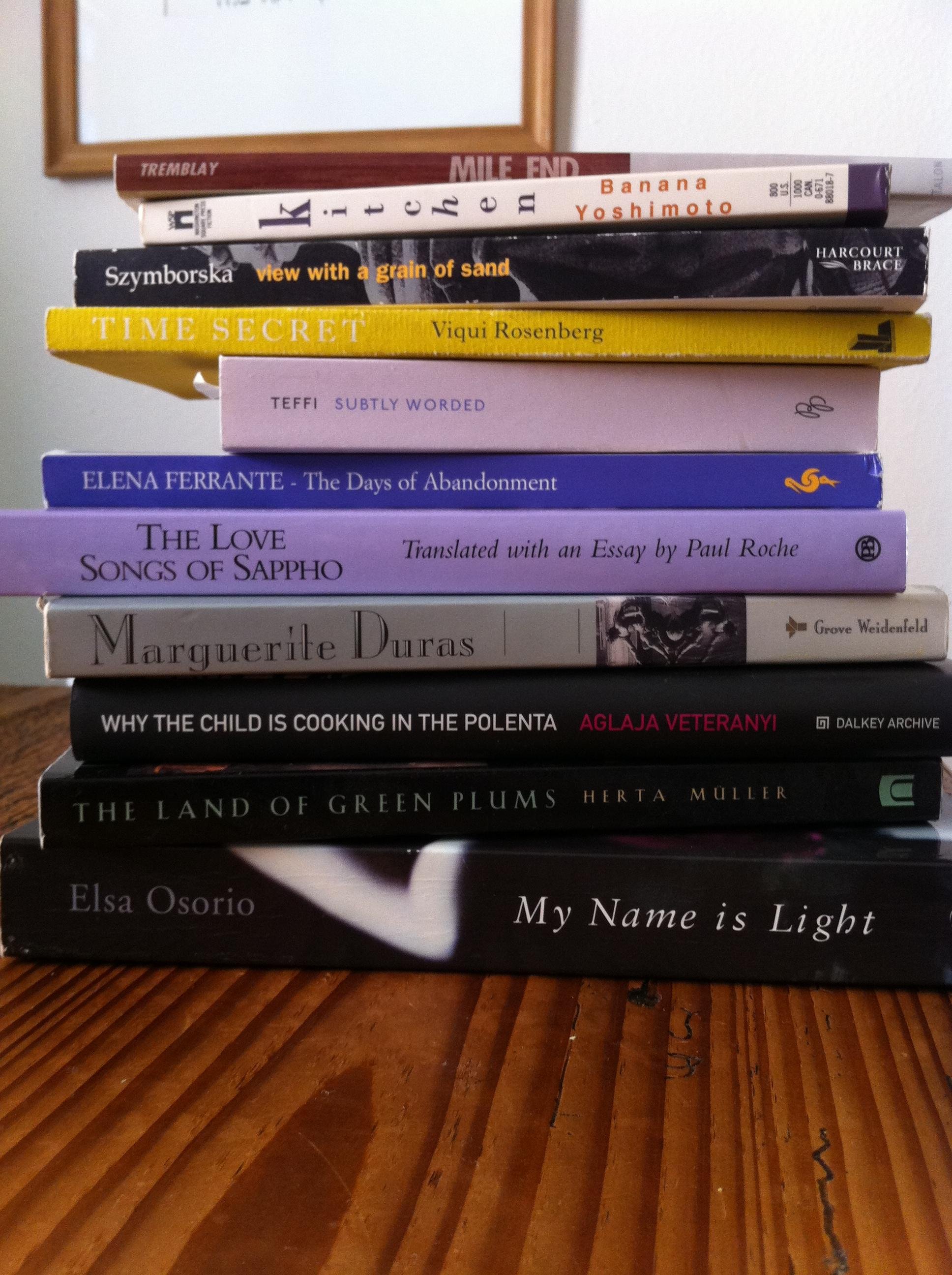 Death in Spring by Mercè Rodoreda, translated from Catalan by Martha Tennent (Open Letter, 2009). A gorgeously written and harrowing novel about cruelty among humans and violence in nature.Days of Abandonment by Elena Ferrante, translated from Italian by Ann Goldstein (Europa Editions, 2005). A dark, slender novel about a woman abandoned by her husband spiraling into terrifying psychological territory, with a helpful dash of absurd humor and redemption. After devouring this book, anything else was VERY difficult to get into. So good. This brief review in The New Yorker is spot on. I have not cracked open her more recent Neapolitan series, but it is definitely on the docket.The End of the Story by Liliana Heker, translated from Spanish by Andrea G. Labinger (Biblioasis, 2012). Another dark novel. I'm sensing a trend? This metafictional work explores Argentina's Dirty War. I reviewed it for Ploughshares.Death as a Side Effect by Ana Maria Shua, translated from Spanish by Andrea G. Labinger (University of Nebraska Press, 2010). As I note briefly in my review of Heker's novel, Shua's is "dark and wry and screwed up in the best possible dystopian way." Is it weird to quote myself? Oh well.Dreams and Stones by Magdalena Tulli, translated from Polish by Bill Johnston (Archipelago Books, 2004). I adore Archipelago for focusing on translation and producing truly beautiful books. Dreams and Stones is probably the least dark book on my list, a kind of treatise on cities and imagination.Mile End by Lise Tremblay, translated from French by Gail Scott (Talon Books, 2002). I read this novel a few times, starting in a class in college on literary Montreal. It's set in the neighborhood I lived in while at McGill, which may be part of my attachment to it. And, yes, yes, this is another dark story, about an obese pianist at a ballet school teetering toward psychosis.The Land of Green Plums by Herta Muller, translated from German by Michael Hoffman (Metropolitan Books, 1996). Muller, winner of the 2009 Nobel Prize in literature, paints a grim picture of life in Romania under Ceausescu. The language is highly poetic, and I've been working on an essay about it (among other things) for quite some time. In fact, the assignment I've given myself for the next few weeks is to cut that essay up paragraph by paragraph to figure out how to keep going with it.Why the Child is Cooking in the Polenta by Aglaja Veteranyi, translated from German by Vincent Kling (Dalkey Archive Press, 2012). Told from the point of view of an unnamed young woman, this is the story of Romanian refugees who travel through Europe as circus performers. Yes, yes, dark. But also with absurd humor. (Some criticize Muller for being humorless. I say, bah. Read her still. Not everything is funny ha ha.)Phew. That's a lot of recommendations. There are more in my pile. I may write more about them. More likely I will tweet my favorite bits from them in August. But not just August. Probably all year. WITForever!My To-Be-Read Pile. Stay tuned for reviews & more !
Death in Spring by Mercè Rodoreda, translated from Catalan by Martha Tennent (Open Letter, 2009). A gorgeously written and harrowing novel about cruelty among humans and violence in nature.Days of Abandonment by Elena Ferrante, translated from Italian by Ann Goldstein (Europa Editions, 2005). A dark, slender novel about a woman abandoned by her husband spiraling into terrifying psychological territory, with a helpful dash of absurd humor and redemption. After devouring this book, anything else was VERY difficult to get into. So good. This brief review in The New Yorker is spot on. I have not cracked open her more recent Neapolitan series, but it is definitely on the docket.The End of the Story by Liliana Heker, translated from Spanish by Andrea G. Labinger (Biblioasis, 2012). Another dark novel. I'm sensing a trend? This metafictional work explores Argentina's Dirty War. I reviewed it for Ploughshares.Death as a Side Effect by Ana Maria Shua, translated from Spanish by Andrea G. Labinger (University of Nebraska Press, 2010). As I note briefly in my review of Heker's novel, Shua's is "dark and wry and screwed up in the best possible dystopian way." Is it weird to quote myself? Oh well.Dreams and Stones by Magdalena Tulli, translated from Polish by Bill Johnston (Archipelago Books, 2004). I adore Archipelago for focusing on translation and producing truly beautiful books. Dreams and Stones is probably the least dark book on my list, a kind of treatise on cities and imagination.Mile End by Lise Tremblay, translated from French by Gail Scott (Talon Books, 2002). I read this novel a few times, starting in a class in college on literary Montreal. It's set in the neighborhood I lived in while at McGill, which may be part of my attachment to it. And, yes, yes, this is another dark story, about an obese pianist at a ballet school teetering toward psychosis.The Land of Green Plums by Herta Muller, translated from German by Michael Hoffman (Metropolitan Books, 1996). Muller, winner of the 2009 Nobel Prize in literature, paints a grim picture of life in Romania under Ceausescu. The language is highly poetic, and I've been working on an essay about it (among other things) for quite some time. In fact, the assignment I've given myself for the next few weeks is to cut that essay up paragraph by paragraph to figure out how to keep going with it.Why the Child is Cooking in the Polenta by Aglaja Veteranyi, translated from German by Vincent Kling (Dalkey Archive Press, 2012). Told from the point of view of an unnamed young woman, this is the story of Romanian refugees who travel through Europe as circus performers. Yes, yes, dark. But also with absurd humor. (Some criticize Muller for being humorless. I say, bah. Read her still. Not everything is funny ha ha.)Phew. That's a lot of recommendations. There are more in my pile. I may write more about them. More likely I will tweet my favorite bits from them in August. But not just August. Probably all year. WITForever!My To-Be-Read Pile. Stay tuned for reviews & more !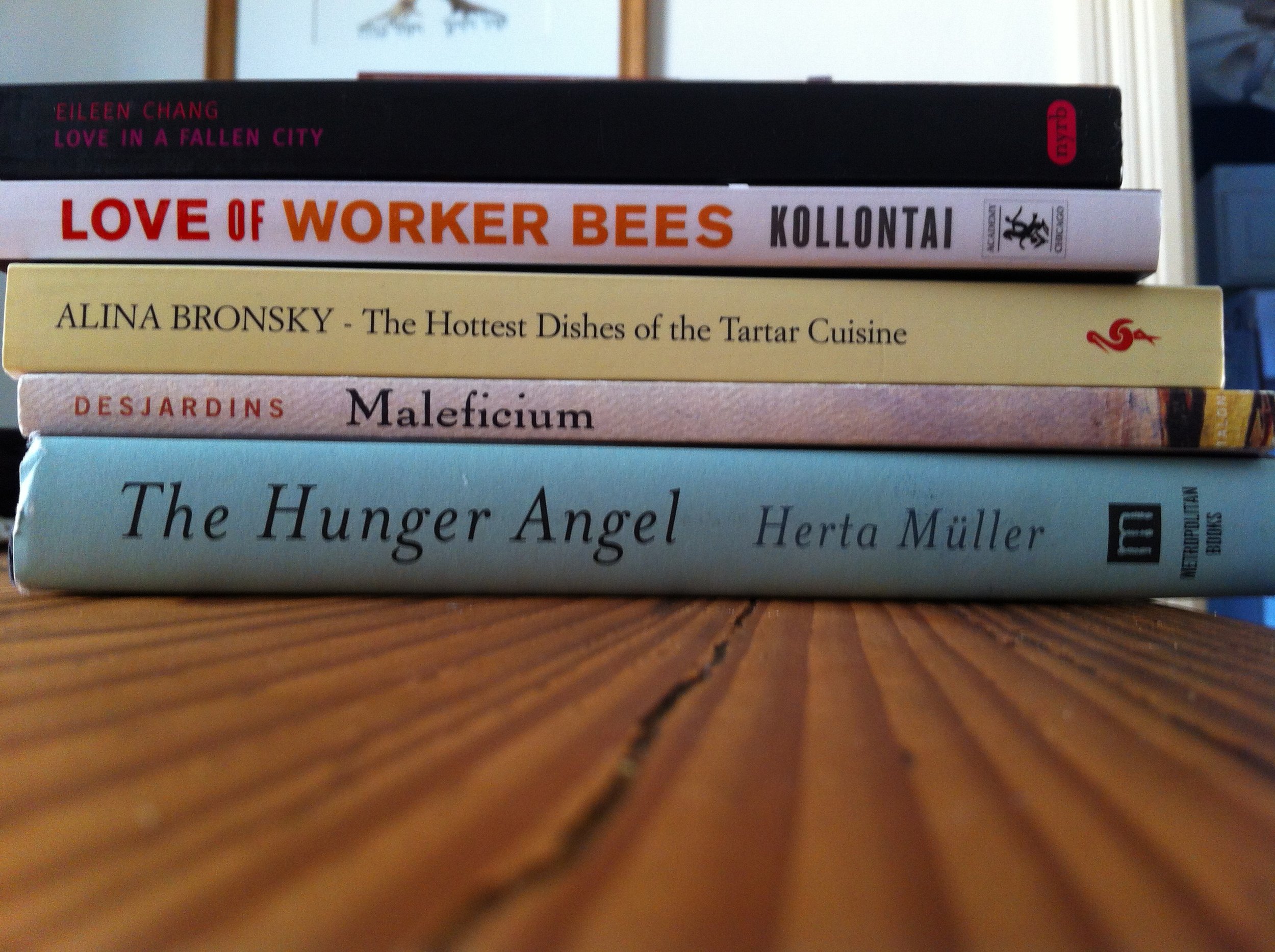
 This year, AWP has been schmoozier, in a pleasant way, as I spent more time with readings, receptions, and lunch/coffee/dinner dates and less time with panels and the book fair. We took a break from the conference Friday night to see Mr. Burns at the Gutherie Theater, an apocalyptic play spanning from the near future to 75 years into the future, in which the surviving population tries to retell and recreate episodes from The Simpsons (particularly the "Cape Fear" episode) as a way of coping. Over time, The Simpsons evolves into totally weird, wonderful, and scary mythology. I highly recommend it!The two panels I attended were excellent, and I'm posting my notes right over here:Small is the New Big: Working with Independent Presses to Build a Literary CareerModerator: Michelle Brower, agent at Folio Literary ManagementPanelists: Molly Fuller, Production Editor of Coffee House Press; Ethan Nosowsky, Editorial Director of Graywolf Press; Erin Harris, agent at Folio Literary Management; and Cal Morgan, Executive Editor of Harper and Editorial Director of Harper Perennial.
This year, AWP has been schmoozier, in a pleasant way, as I spent more time with readings, receptions, and lunch/coffee/dinner dates and less time with panels and the book fair. We took a break from the conference Friday night to see Mr. Burns at the Gutherie Theater, an apocalyptic play spanning from the near future to 75 years into the future, in which the surviving population tries to retell and recreate episodes from The Simpsons (particularly the "Cape Fear" episode) as a way of coping. Over time, The Simpsons evolves into totally weird, wonderful, and scary mythology. I highly recommend it!The two panels I attended were excellent, and I'm posting my notes right over here:Small is the New Big: Working with Independent Presses to Build a Literary CareerModerator: Michelle Brower, agent at Folio Literary ManagementPanelists: Molly Fuller, Production Editor of Coffee House Press; Ethan Nosowsky, Editorial Director of Graywolf Press; Erin Harris, agent at Folio Literary Management; and Cal Morgan, Executive Editor of Harper and Editorial Director of Harper Perennial.
- Access to early and frequent publication (such as online) has allowed an enormous amount of creativity. Adventurous small presses are publishing successful works, and big houses are discovering writers earlier as a result. -Cal Morgan
- Small presses take on books that might not seem readily marketable from a big publisher's perspective, but can maximize those books' audiences. -Ethan Nosowsky
- Small presses can facilitate reviews that build the writer's readership. -Erin Harris
- The reputation and backlist of a small press have cultural capital. -Molly Fuller
- Small presses are also an opportunity for seasoned authors to try something new. -Michelle Brower
- Many authors who work with both small and big presses are big supporters of new writers and facilitate connections. -Cal Morgan
- It was a relief to hear all the panelists are avid readers of small press books!
Examples of successes:
- Eiomear McBride's A Girl is a Half-Formed Thing, published by Coffee House after the author spent 10 years trying to get it published and being told the publishers loved it but thought readers wouldn't enjoy it. You may already know the book is enormously successful.
- Erin Harris found short story writer Stacy Tintocalis after reading her collection The Tiki King, published by Swallow Press, an imprint of Ohio University Press, and discovered Brian Furuness, author of The Lost Episodes of Revie Bryson (Dzanc) after reading two of his stories in literary magazines.
- Graywolf Press published a 20-year retrospective of Geoff Dyer's essays and was able to do so successfully based on its backlist of essay collections.
- Cal Morgan discovered Blake Butler after publishing his short stories in the blog Fifty-Two Stories; he went on to publish three books from Butler, and Butler connected him to more authors.
It's a Crime to Skip this Panel: Approaches to Crime Fiction(Nb. The authors on this panel have multiple books out--see the link above for a more expansive list.)Moderator: Michael Kardos, author of Before He Finds Her.Panelists: Joy Castro, author of Hell or High Water; Chris Abani, author of Secret History of Las Vegas; Christopher Coake, author of You Came Back; Lori Rader-Day, author of The Black Hour.
- Much of great literature (Beloved, The Great Gatsby) spins around a crime. -Michael Kardos
- Joy Castro explores the chasm between the ideal of legal justice and its reality. She asks: whose law? To control whose bodies is the law written? Who is permitted to get away with crime? Who isn't? How does the aftermath manifest?
- The best suspense comes from characters: embed them with contradictions and set them loose. Don't choose a main character who knows everything. -Joy Castro
- Misdirections and clues should all arise from point of view: different characters will pick up on different things. -Lori Rader-Day
- Think of pacing as interval training, alternating between intense, fast-paced, action-packed scenes and more quiet, emotional scenes. -Joy Castro
- Every story is a riddle. Stories trace an outline for the riddle of living. We don't care about characters who are not fucked up. -Chris Abani
- Good art sets out to do something and does it. That's all there is. There are no genres. -Chris Abani
- Finding the voice of the novel is key to finding the novel. -Joy Castro
- Structure is the skeleton of a book. Voice is its soul, its reason for existence. -Chris Abani
- If you're a surgeon and remove the wrong kidney, that's bad. You have so many opportunities to get your book right. -Michael Kardos
On research:
- Read two books then close your eyes. -Christopher Coake
- Write the book before you do research, then research what you need to know. -Lori Rader-Day
- Research a lot then forget it. Don't write with your notes open; the divine details will come to you. -Joy Castro (My preferred approach...I love research and tend to pick stories that require it.)
- The only question you need is "Why?" -Chris Abani
Book Fair Loot!I sprinted through the book fair in the last 45 minutes on Saturday. I managed to get something from every genre, as well something from every "genre" of book fair stuff: freebies, cheapies, full price-ys, a notepad, bookmarks, and even an adorable pinwheel from Pacifica Literary Review, fashioned from pages of poetry.I'm also happy to discover that Twitter *can* work for authors. Shulem Deem, author of the memoir All Who Go Do Not Return (Graywolf Press) followed me on Twitter several months ago; I was intrigued by the premise of his memoir, which is about leaving the Hasidic Jewish community; and his was the first book I bought at the fair. Can't wait to read it.See you in L.A. in 2016!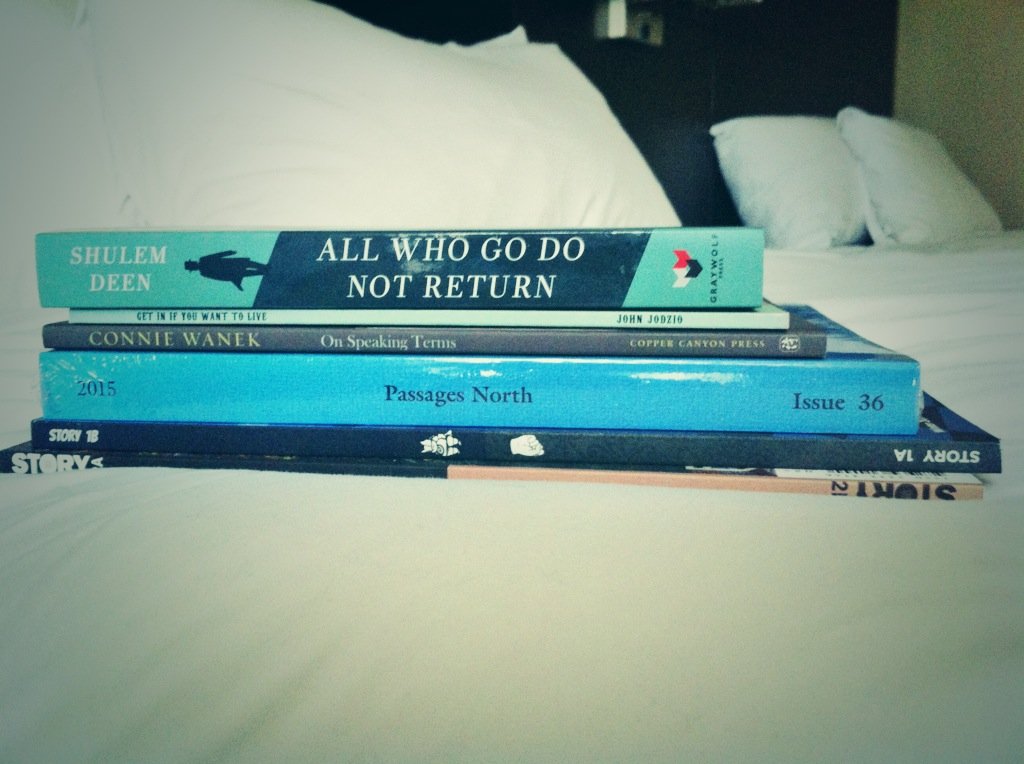
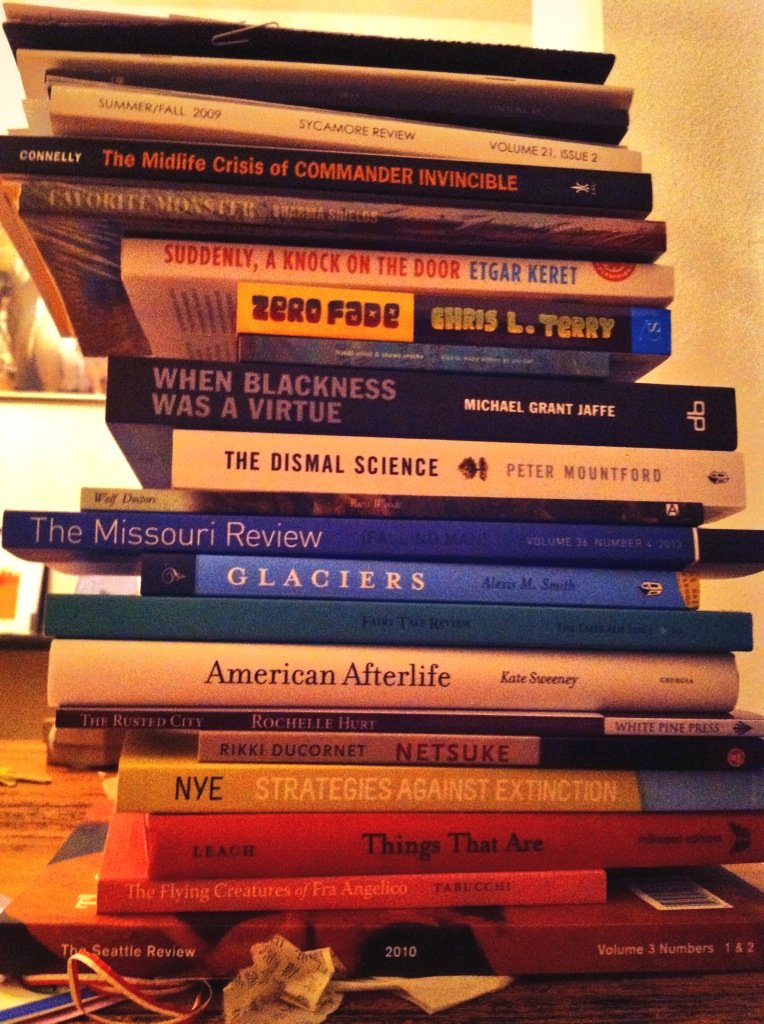 Forgive my hyperbole, but I really enjoyed AWP this year. Maybe it was because this was the fourth I attended, so it was less overwhelming. Maybe it was because it was in Seattle, so I got to see so many friends and sleep in my own bed. Maybe it was because I had a chance to read alongside some really lovely writers. Maybe it was because I got to bring M to the book fair on Saturday and he made many tired exhibitors laugh. I *did* have violent heart palpitations the weekend before the conference as I stressed out over the three readings I had, but somehow these subsided by Tuesday, and by Thursday it was one big love fest. Here are some highlights.Notes on the PracticalOn Thursday I attended Kristen Young's panel Like Sand to a Beach: Bringing Your Book to Market. Jarrett Middleton of Dark Coast Press gave a really informative overview of the publishing process, especially when it comes to distribution. I had no idea how scary a pre-sales conference is (when a publisher pitches the merits of a title to all the big guns of a distributor and they try to poke holes in your marketing plan). I also didn't know that a book has about 90 days or one quarter in a bookstore before it gets returned to the warehouse. Karen Maeda Allman of Elliott Bay Book Company gave the bookseller's perspective. My favorite advice of hers about author events is to "invite everyone you know, encourage them to bring friends, and invite your 'Kevin Bacon' friend--the one who knows everyone." All of her presentation slides are available on this beautiful Tumblr. Author Jonathan Evison emphasized building communities and taking the time to invite friends individually to your events rather than through mass emails. He also said, "Even if only six people come to your B & N event in south Austin, take the events coordinator to the Cheesecake Factory afterwards and get her drunk. She'll keep selling your books." Finally, Rachel Fershleiser of Tumblr gave an overview her experiences as a book publicist and of what she calls the "bookternet" -- smart people being silly on the internet with sites like Last Night's Reading.A Controversial PanelFriday morning I attended the panel Magic and Intellect. It was packed to the gills; magic must be popular! Something extraordinary occurred at this panel that so far one blogger I know of has recounted and it is worthwhile to read her account. I hope more people will write on it. I haven't had the mind space to do so; I'm still processing. But I did come away from it feeling affirmed, that imaginative writing is necessary. Rikki Ducornet said, "The human mind & imagination cannot sustain itself in a constant state of emergency," and Kate Bernheimer said, "Solutions in fairy tales often require radical acts. If you're in an incestuous, abusive relationship, you might need to cut off your finger to use as a key to get out of a room." And Rikki Ducornet offered this advice: "For a difficult book to be readable, 'find a language that levitates somehow, that is scintillating'" (last quotation via Mackenzie Hulton on Twitter).One Really Cool Thing from the Book Fair: Envisioning the Future of the BookI cannot begin to describe the many, many books I acquired last week. So I will simply share one very cool thing, Columbia College Chicago's Center for Book & Paper Expanded Artists' Books. They displayed a hybrid artist book with heat-sensitive ink and an embedded iPad; if you pressed your hand on the page, different words erased and different words appeared on the iPad. What alchemy.Readings GaloreI had the pleasure of reading fairy tales with Maya Sonenberg, Rikki Ducornet, and Valerie Arvidson. I was pleasantly surprised to see a fairly large room fill with people eager to hear stories. Somehow each of us included food in our stories--I hurriedly jotted the phrase "saffron buns and candied salmon" as Valerie read--and that made me immensely happy.At Canoe Social Club, I read with Andrew Ladd, Michael Nye, and Wesley Rothman. I'd finished Andrew's book What Ends Tuesday night and it had me sobbing by the end. In addition to making me think about the issues that got me crying, it got me thinking about the books that also made me cry like that--Sophie's Choice, A Tree Grows in Brooklyn-- so maybe I'll write a separate post on that topic. I picked up Michael's story collection Strategies Against Extinction; of course I will read the story "Sparring Vladimir Putin" first because obviously. I can't wait. Wesley is working on a collection that may be called Sub-Woofer--keep your ears peeled!Chris Abani and Chang-rae Lee did a wonderful reading and conversation. I already read The Secret History of Las Vegas (it's powerful!), but hearing Chris read the opening and another section concerned with fairy tales gave me shivers.I got to read with 13 others affiliated with the Univesity of Washington MFA and the Cambridge Writers Workshop. We filled up Victrola's back room and then most of us retired to Coastal Kitchen for drinks, snacks, and exquisite corpse. Coincidentally, I sat beside someone I'd only known through twitter and had no idea would be there. The future is now!In the lovely subterranean Alibi Room, I got to see the UNC-Wilmington alumni reading, which featured several friends and which introduced me to the wonderful work of Rochelle Hurt and Kate Sweeney. You should check out their respective books, The Rusted City and American Afterlife. Finally, read Paul Constant's take on the conference here, which includes high praise for my Furnace co-conspirator Corinne Manning and her Alice Blue chapbook "A Slow and Steady Eruption." Hooray!
Forgive my hyperbole, but I really enjoyed AWP this year. Maybe it was because this was the fourth I attended, so it was less overwhelming. Maybe it was because it was in Seattle, so I got to see so many friends and sleep in my own bed. Maybe it was because I had a chance to read alongside some really lovely writers. Maybe it was because I got to bring M to the book fair on Saturday and he made many tired exhibitors laugh. I *did* have violent heart palpitations the weekend before the conference as I stressed out over the three readings I had, but somehow these subsided by Tuesday, and by Thursday it was one big love fest. Here are some highlights.Notes on the PracticalOn Thursday I attended Kristen Young's panel Like Sand to a Beach: Bringing Your Book to Market. Jarrett Middleton of Dark Coast Press gave a really informative overview of the publishing process, especially when it comes to distribution. I had no idea how scary a pre-sales conference is (when a publisher pitches the merits of a title to all the big guns of a distributor and they try to poke holes in your marketing plan). I also didn't know that a book has about 90 days or one quarter in a bookstore before it gets returned to the warehouse. Karen Maeda Allman of Elliott Bay Book Company gave the bookseller's perspective. My favorite advice of hers about author events is to "invite everyone you know, encourage them to bring friends, and invite your 'Kevin Bacon' friend--the one who knows everyone." All of her presentation slides are available on this beautiful Tumblr. Author Jonathan Evison emphasized building communities and taking the time to invite friends individually to your events rather than through mass emails. He also said, "Even if only six people come to your B & N event in south Austin, take the events coordinator to the Cheesecake Factory afterwards and get her drunk. She'll keep selling your books." Finally, Rachel Fershleiser of Tumblr gave an overview her experiences as a book publicist and of what she calls the "bookternet" -- smart people being silly on the internet with sites like Last Night's Reading.A Controversial PanelFriday morning I attended the panel Magic and Intellect. It was packed to the gills; magic must be popular! Something extraordinary occurred at this panel that so far one blogger I know of has recounted and it is worthwhile to read her account. I hope more people will write on it. I haven't had the mind space to do so; I'm still processing. But I did come away from it feeling affirmed, that imaginative writing is necessary. Rikki Ducornet said, "The human mind & imagination cannot sustain itself in a constant state of emergency," and Kate Bernheimer said, "Solutions in fairy tales often require radical acts. If you're in an incestuous, abusive relationship, you might need to cut off your finger to use as a key to get out of a room." And Rikki Ducornet offered this advice: "For a difficult book to be readable, 'find a language that levitates somehow, that is scintillating'" (last quotation via Mackenzie Hulton on Twitter).One Really Cool Thing from the Book Fair: Envisioning the Future of the BookI cannot begin to describe the many, many books I acquired last week. So I will simply share one very cool thing, Columbia College Chicago's Center for Book & Paper Expanded Artists' Books. They displayed a hybrid artist book with heat-sensitive ink and an embedded iPad; if you pressed your hand on the page, different words erased and different words appeared on the iPad. What alchemy.Readings GaloreI had the pleasure of reading fairy tales with Maya Sonenberg, Rikki Ducornet, and Valerie Arvidson. I was pleasantly surprised to see a fairly large room fill with people eager to hear stories. Somehow each of us included food in our stories--I hurriedly jotted the phrase "saffron buns and candied salmon" as Valerie read--and that made me immensely happy.At Canoe Social Club, I read with Andrew Ladd, Michael Nye, and Wesley Rothman. I'd finished Andrew's book What Ends Tuesday night and it had me sobbing by the end. In addition to making me think about the issues that got me crying, it got me thinking about the books that also made me cry like that--Sophie's Choice, A Tree Grows in Brooklyn-- so maybe I'll write a separate post on that topic. I picked up Michael's story collection Strategies Against Extinction; of course I will read the story "Sparring Vladimir Putin" first because obviously. I can't wait. Wesley is working on a collection that may be called Sub-Woofer--keep your ears peeled!Chris Abani and Chang-rae Lee did a wonderful reading and conversation. I already read The Secret History of Las Vegas (it's powerful!), but hearing Chris read the opening and another section concerned with fairy tales gave me shivers.I got to read with 13 others affiliated with the Univesity of Washington MFA and the Cambridge Writers Workshop. We filled up Victrola's back room and then most of us retired to Coastal Kitchen for drinks, snacks, and exquisite corpse. Coincidentally, I sat beside someone I'd only known through twitter and had no idea would be there. The future is now!In the lovely subterranean Alibi Room, I got to see the UNC-Wilmington alumni reading, which featured several friends and which introduced me to the wonderful work of Rochelle Hurt and Kate Sweeney. You should check out their respective books, The Rusted City and American Afterlife. Finally, read Paul Constant's take on the conference here, which includes high praise for my Furnace co-conspirator Corinne Manning and her Alice Blue chapbook "A Slow and Steady Eruption." Hooray!
Whew, July was busy. I went to the Tin House Writer's Workshop for the first time, and I hope not the last. And I went to New York for a week after that (more in a subsequent post). There's still a ton of information from the conference sifting through the crevices of my mind, but here's a grab bag of favorites, with some bolded text and lots of links just for fun.
- I studied with Benjamin Percy, who advised our short story workshop to "Grab [readers] by the throat and drag 'em down the rabbit hole," which might be my favorite writing advice, second only to "Forget the reuben. Focus on the ninjas."
- In a panel on publishing and Tin House, Rob Spillman advised, "Don't send your work out when you're feeling creative. Send it out when you're feeling organized," which is a useful reminder, and at the agent panel he called debut author advances "Capitalism at its scariest," which is something that will lurk in a corner of my brain for a good long while.
- On character, Jodi Angel said, "We don't go to the page to make friends. We go to see something other and apart from who we are."
- Karen Russell gave a talk on the art of long sentences and how they can give an "occult sense of how another mind moves, from word to word."
- On place, Luis Urrea urged, "Don't use place. Inhabit it. [....] You are a place. As a place, you must be a shame-free zone [....] Writing prompt: go out and rub dirt on your face."
- On time, Jess Walter suggested: if you're stuck in a story, consider making the clock more specific.
- Anthony Doerr's talk on failure ended with this.
- Also, I fell in love with Dorothea Lasky. Her latest collection of poetry is Thunderbird.
Again and again, throughout the week, it seemed everyone suggested you should write the story that only you can write, that you should pay "ruthless and tender attention" (Steve Almond, there) to life. At least some of the talks will be available online sometime. In the meantime, here's a link to podcasts from previous conferences.
Stay in the loop! Sign up here for a short & sweet monthly newsletter of upcoming events, publications, practical writing tips, notes from AWP, and tiny bits on art, food, cities, and literature. Like this blog, but less often and right in your inbox.[mailchimp_subscriber_popup baseUrl='mc.us16.list-manage.com' uuid='f003e73335195658bffdce511' lid='45632cd706' usePlainJson='true' isDebug='false']
